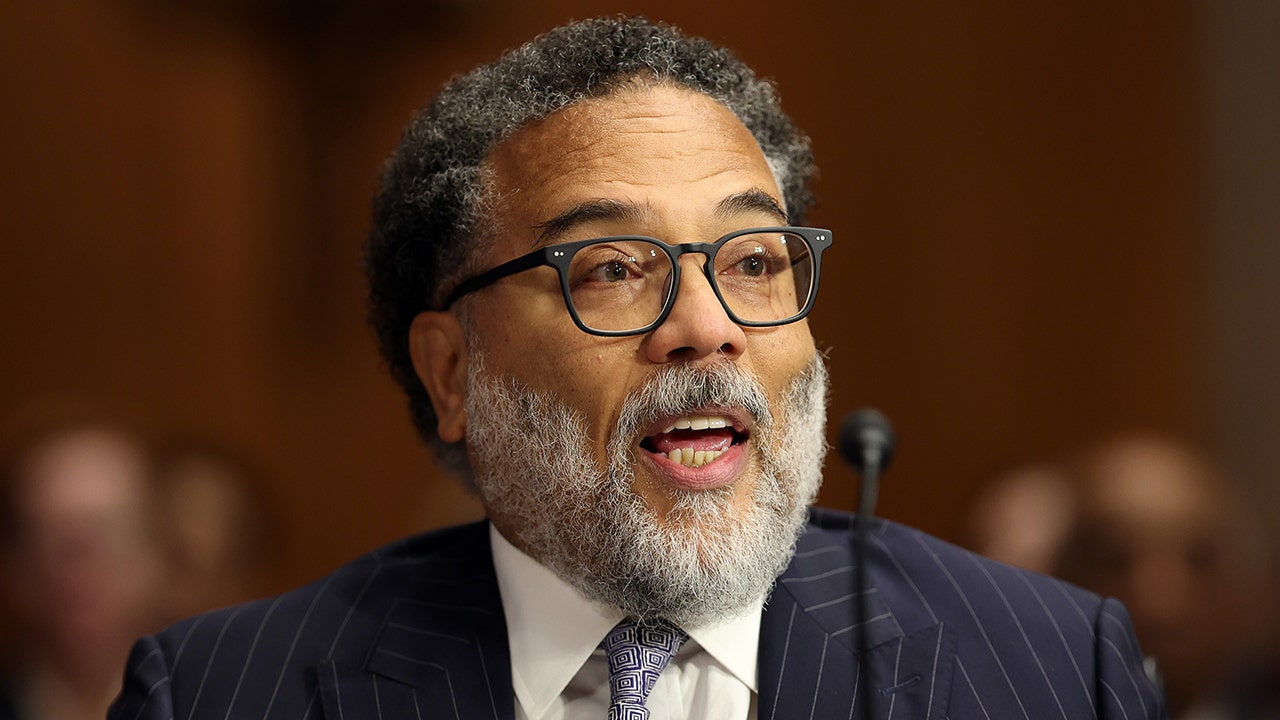Education
Biden Looks for New Ways to Energize Black Voters

During a recent town hall with the Congressional Black Caucus, Vice President Kamala Harris offered a gut check to the 200 people who had gathered to take stock of the state of civil rights in America.
“We are looking at a full-on attack on our hard-fought, hard-won freedoms,” Ms. Harris told the crowd, which erupted in applause as she spoke. “So much is at stake,” she said of the 2024 presidential election, “including our very democracy.”
In 2020, President Biden promised Black voters he would deliver a sweeping “racial equity” agenda that included a landmark federal voting rights bill, student loan relief, criminal justice reform and more. Three years later, with much of that agenda thwarted by Congress or the courts, the White House is looking for new ways to re-energize a crucial constituency that helped propel Mr. Biden to the presidency.
That means describing the stakes of the election in stark terms, as Ms. Harris did over the summer in Boston, arguing that the Republican Party is trying to reverse generations of racial progress in America. But Mr. Biden is also asking voters to judge him on a series of achievements that benefit Black Americans — but that are hardly the marquee promises from the early days of his administration.
In recent weeks, the Biden administration has gone out of its way to highlight its economic accomplishments, which include the lowest Black unemployment rate on record and the fastest creation rate of Black-owned small businesses in over 25 years. It has pointed to social policy efforts, such as increased enrollment in Obamacare and closing the digital divide, as examples of real impacts on the Black community.
In an opinion essay published on Sunday in The Washington Post, marking the 60th anniversary of the March on Washington, Mr. Biden said his stewardship of the economy — a top concern among Black voters — was helping to fulfill the nation’s promise of equality.
The president wrote that his administration was “advancing equity in everything we do making unprecedented investments in all of America, including for Black Americans.”
Administration officials acknowledge that some of those advances may not immediately resonate with a population that sees its constitutional rights under assault. While polls show continued strong support for Mr. Biden among Black voters, there are growing concerns about an enthusiasm gap among the most loyal constituencies in the Democratic Party.
Neera Tanden, Mr. Biden’s domestic policy adviser, said the president was focused on dismantling inequities that had been embedded for decades.
“I think we’ll have a transformative change,” Ms. Tanden said, pointing to executive orders Mr. Biden signed in his first days in office, which directed federal agencies to consider racial equity when it comes to the distribution of money and benefits.
But, she added, “it won’t be something millions of people feel in a minute.”
For Black Americans like Maeia Corbett, the promises of future benefits ring hollow.
“Looking at these promises that this administration has made, it’s like a whirlwind,” said Ms. Corbett, 27. “What can I grasp onto when all of these things are being taken from me?”
Ms. Corbett, who graduated from college just months before the coronavirus pandemic brought student loan payments to a pause, had been banking on Mr. Biden’s promise to cancel up to $20,000 in student loan debt for millions of borrowers.
When the Supreme Court ruled in June that Mr. Biden’s plan was unconstitutional, Ms. Corbett, like many Black Americans, felt a familiar sting of disappointment. The fact that the decision came just 24 hours after the court struck down affirmative action in college admissions, a longstanding mechanism for economic and social mobility for Black people, was almost disorienting.
“It’s like you get to the steps of equity and the steps are torn down,” she said.
Ms. Corbett’s sentiments are a warning sign for the president, who has tied the success of his presidency to racial progress. Mr. Biden has said he would use the power of his office to address inequity in housing, criminal justice, voting rights, health care, education and economic mobility.
“I’m not promising we can end it tomorrow,” Mr. Biden said in January 2021. “But I promise you: We’re going to continue to make progress to eliminate systemic racism, and every branch of the White House and the federal government is going to be part of that effort.”
Melanie L. Campbell, the president of the nonpartisan National Coalition on Black Civic Participation, said Black women — widely credited with securing Mr. Biden’s win — could see tangible progress in historic appointments of Black women to cabinet positions and the federal judiciary, including Ketanji Brown Jackson to the Supreme Court.
But the courts, conservative activists and a bitterly divided Congress have curtailed a lot of Mr. Biden’s agenda. Lawsuits have held up the administration’s efforts to forgive the debts of Black and other minority farmers after years of discrimination. Congress has blocked two signature pieces of legislation Mr. Biden championed, the George Floyd Justice in Policing Act and the John R. Lewis Voting Rights Advancement Act. And conservative groups have vowed to pursue legislation challenging Mr. Biden’s plans to prioritize race-conscious policies throughout the federal government.
Now, with aides describing him as frustrated over the setbacks, Mr. Biden is taking pains to cast the election as a choice between his agenda and the extremism of “MAGA Republicans,” or those loyal to former President Donald J. Trump.
“My dad used to say: ‘Joey, don’t compare me to the Almighty. Compare me to the alternative,’” Mr. Biden says in a common refrain.
Cedric Richmond, a co-chairman of the Biden campaign, said the campaign would emphasize that Mr. Biden should not be blamed for the Supreme Court decisions. “It’s the court that just rolled back equity, and we’re going to point to it,” he said.
A recent Axios survey of more than 780 college students and recent graduates found that 47 percent of voters blamed the Supreme Court for student loans not being forgiven, 38 percent blamed Republicans and 10 percent blamed Mr. Biden.
Still, polls show that Black voters under 30 have far less enthusiasm for Mr. Biden than their elders do.
Mary-Pat Hector, the chief executive of Rise, a student advocacy organization that has pushed for student debt relief and college affordability, said the disillusionment among young voters was real. On issues like student loan debt and climate, Ms. Hector said, all the voters see are “things we were told were going to happen that just haven’t happened.”
“When it comes to Gen Z,” she said, “they don’t forget, and it’s hard for them to forgive.”
In the meantime, the White House says it has not given up on its most ambitious goals.
This month, the Education and Justice Departments released guidance for how colleges should navigate the affirmative action decision, urging them to continue to strive for diversity. And the Education Department is preparing to start new loan programs, while delivering billions in loan relief by fixing existing programs that have long disenfranchised Black borrowers. And dozens of federal agencies are working through “equity action plans” tackling everything from disparities in home appraisals to maternal mortality.
Stephen K. Benjamin, Mr. Biden’s director of public engagement, said he believed the administration’s economic record would resonate, even as he acknowledged that the White House needed help from Congress to make good on its broader agenda.
“I do believe when the rubber hits the road,” he said, “people will pay more attention to these dramatic investments in their quality of life.”
Lennore Vinnie, 53, said she felt the administration was looking out for people like her.
Having benefited from affirmative action when she entered the white, male-dominated information technology field in the 1990s, Ms. Vinnie, a single mother of two, incurred $280,000 in student loan debt after years of pursuing a doctoral degree to advance to a senior leadership position. Some of the debt was acquired at predatory for-profit colleges.
“I know for me, as an African American woman, you can never have too many degrees or too many credentials,” she said, “because that way I take away all your reasons for not putting me in the position.”
Ms. Vinnie, who ultimately obtained her doctorate and her promotion, is applying for relief through loan forgiveness programs that were not affected by the Supreme Court ruling.
Ms. Harris’s appearance before the Congressional Black Caucus in Boston encapsulated the administration’s strategy moving forward: highlighting its progress while rallying a community to remember — and repeat — history.
In Boston, the crowd was rapt, shouting “preach!” as she called out “extremist so-called leaders” who sought to distract from the nation’s legacy of slavery and systemic racism.
Ms. Harris then reminded the room that Black voters drove Mr. Biden to win the presidency in 2020, and made her the first Black vice president. “The future of America,” she said, “has always relied on the folks who are in this room.”

Education
Video: Several Killed in Wisconsin School Shooting, Including Juvenile Suspect

new video loaded: Several Killed in Wisconsin School Shooting, Including Juvenile Suspect
transcript
transcript
Several Killed in Wisconsin School Shooting, Including Juvenile Suspect
The police responded to a shooting at a private Christian school in Madison, Wis., on Monday.
-
Around 10:57 a.m., our officers were responding to a call of an active shooter at the Abundant Life Christian School here in Madison. When officers arrived, they found multiple victims suffering from gunshot wounds. Officers located a juvenile who they believe was responsible for this deceased in the building. I’m feeling a little dismayed now, so close to Christmas. Every child, every person in that building is a victim and will be a victim forever. These types of trauma don’t just go away.
Recent episodes in Guns & Gun Violence
Education
Video: Biden Apologizes for U.S. Mistreatment of Native American Children

new video loaded: Biden Apologizes for U.S. Mistreatment of Native American Children
transcript
transcript
Biden Apologizes for U.S. Mistreatment of Native American Children
President Biden offered a formal apology on Friday on behalf of the U.S. government for the abuse of Native American children from the early 1800s to the late 1960s.
-
The Federal government has never, never formally apologized for what happened until today. I formally apologize. It’s long, long, long overdue. Quite frankly, there’s no excuse that this apology took 50 years to make. I know no apology can or will make up for what was lost during the darkness of the federal boarding school policy. But today, we’re finally moving forward into the light.
Recent episodes in Politics
Education
Video: Los Angeles Bus Hijacked at Gunpoint

new video loaded: Los Angeles Bus Hijacked at Gunpoint
transcript
transcript
Los Angeles Bus Hijacked at Gunpoint
The person suspected of hijacking a bus which killed one person, was taken into custody after an hourlong pursuit by the Los Angeles Police Department early Wednesday morning.
-
“Get him.”
Recent episodes in Guns & Gun Violence
-

 Business7 days ago
Business7 days agoThese are the top 7 issues facing the struggling restaurant industry in 2025
-

 Culture7 days ago
Culture7 days agoThe 25 worst losses in college football history, including Baylor’s 2024 entry at Colorado
-

 Sports6 days ago
Sports6 days agoThe top out-of-contract players available as free transfers: Kimmich, De Bruyne, Van Dijk…
-

 Politics5 days ago
Politics5 days agoNew Orleans attacker had 'remote detonator' for explosives in French Quarter, Biden says
-

 Politics5 days ago
Politics5 days agoCarter's judicial picks reshaped the federal bench across the country
-

 Politics3 days ago
Politics3 days agoWho Are the Recipients of the Presidential Medal of Freedom?
-

 Health2 days ago
Health2 days agoOzempic ‘microdosing’ is the new weight-loss trend: Should you try it?
-

 World7 days ago
World7 days agoIvory Coast says French troops to leave country after decades














